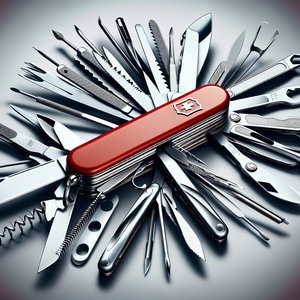Behind the Scenes: The Logistics of Hobby Lobby’s Supply Chain

At its core, a supply chain encompasses all the steps involved in getting a product from its origin to the end consumer. For Hobby Lobby, this involves sourcing materials, manufacturing products, and distributing them across the country. The company operates multiple distribution centers strategically located to optimize delivery routes and minimize costs. Each distribution center receives an array of products from various suppliers, which are then organized and dispatched to retail locations. Hobby Lobby's supply chain is characterized by a well-structured network that allows for quick replenishment of stock. The company sources its products from a multitude of suppliers, including domestic manufacturers and overseas producers. This diversity not only ensures a wide selection of items for customers but also helps mitigate risks associated with relying on a singular source.
The Role of Truck Drivers
Truck drivers are the unsung heroes of Hobby Lobby’s supply chain. They are responsible for transporting goods between distribution centers and retail stores, ensuring that products are delivered on time and in optimal condition. The job is not just about driving; it requires a deep understanding of logistics, time management, and safety protocols. For instance, a truck driver might start their day early in the morning, preparing their vehicle for a long haul. They conduct pre-trip inspections to ensure that their truck is roadworthy, checking everything from tire pressure to brake function. Once on the road, drivers must navigate various terrains and weather conditions, all while adhering to federal regulations regarding driving hours and load limits. The importance of truck drivers cannot be overstated; they are vital in maintaining the flow of inventory to Hobby Lobby's stores. Their ability to deliver products promptly ensures that customers find the items they seek when they visit the store, directly impacting customer satisfaction and sales.
Challenges Faced by Truck Drivers
The journey of a truck driver is fraught with challenges. Traffic congestion, road construction, and unpredictable weather can all impact delivery schedules. Moreover, drivers must also manage the physical demands of the job, which can include long hours of sitting, loading and unloading cargo, and maintaining focus on the road for extended periods. Additionally, the logistics of coordinating deliveries can present challenges. Truck drivers must communicate effectively with dispatchers and warehouse staff to ensure that they arrive at their destinations at the correct times. This requires a level of flexibility, as delays or changes to the schedule are common in the logistics industry. For example, a sudden storm can cause road closures, necessitating rerouting and potential delays in delivery.
Innovative Solutions in Logistics
To address these challenges, Hobby Lobby invests in technology and training. The use of advanced logistics software helps streamline routing and scheduling, allowing drivers to optimize their routes and reduce fuel consumption. For example, GPS tracking and route optimization tools enable drivers to avoid traffic hotspots and select the most efficient paths, saving time and resources. Furthermore, ongoing training ensures that drivers are well-equipped to handle the demands of their job, from safety protocols to customer service skills. Hobby Lobby values the skill set of its drivers and provides them with continuous learning opportunities, enabling them to adapt to new technologies and industry standards. Hobby Lobby also emphasizes the importance of maintaining a positive work culture for its drivers. By offering competitive pay, benefits, and opportunities for advancement, the company not only attracts skilled drivers but also fosters a sense of loyalty and commitment among its workforce. Happy and engaged drivers are more likely to go the extra mile, ensuring that deliveries are made on time and with care.
The logistics of Hobby Lobby’s supply chain is a testament to the hard work and dedication of its truck drivers. Their role is not just about driving; it encompasses problem-solving, adaptability, and a commitment to excellence. As the retail landscape continues to evolve, the importance of a robust supply chain will only grow, making the contributions of truck drivers more critical than ever. By understanding and appreciating the intricacies of this logistics network, consumers can gain insight into the effort that goes into delivering the arts and crafts supplies they cherish. In essence, every time a customer walks into a Hobby Lobby store, they are witnessing the culmination of a carefully orchestrated supply chain, driven by the skilled hands of dedicated truck drivers. The next time you pick up that roll of fabric or a set of paints, remember the journey it took to get there, led by those who quietly keep the wheels of commerce turning.
Logistics Coordinator
Retail chains, distribution centers, logistics firms
Core Responsibilities
Manage and track shipments to ensure timely delivery of goods to retail locations.
Communicate with suppliers, carriers, and internal departments to resolve delivery issues and optimize logistics processes.
Maintain accurate records of inventory, shipments, and delivery schedules.
Required Skills
Strong organizational and multitasking abilities.
Proficiency in logistics software and Microsoft Excel for data analysis.
Excellent communication skills for liaising with various stakeholders.
Supply Chain Analyst
Manufacturing companies, retail corporations, and logistics providers
Core Responsibilities
Analyze supply chain data to identify trends, inefficiencies, and opportunities for cost reduction.
Collaborate with cross-functional teams to implement improvements in supply chain processes.
Prepare reports and presentations to communicate findings and recommendations to management.
Required Skills
Proficiency in data analysis tools (e.g., SQL, Tableau) and Excel for modeling and reporting.
Strong analytical and problem-solving skills to interpret complex data sets.
Familiarity with supply chain management principles and best practices.
Freight Dispatcher
Freight companies, trucking firms, and logistics service providers
Core Responsibilities
Schedule and coordinate the movement of freight to ensure timely deliveries.
Monitor the status of shipments and communicate updates to drivers and customers.
Negotiate rates and contracts with carriers to optimize transportation costs.
Required Skills
Strong understanding of transportation regulations and logistics software.
Excellent organizational and time management skills to handle multiple shipments.
Ability to remain calm under pressure and address issues as they arise.
Warehouse Operations Manager
Retailers, distribution centers, and third-party logistics providers
Core Responsibilities
Oversee daily warehouse operations, including inventory management, shipping, and receiving.
Implement best practices to improve efficiency, safety, and accuracy in warehouse processes.
Train and manage warehouse staff to ensure high performance and compliance with safety protocols.
Required Skills
Strong leadership and team management skills.
Familiarity with warehouse management systems (WMS) and logistics software.
Knowledge of safety regulations and inventory control methods.
Truck Driver (Long-Haul)
Trucking companies, logistics firms, and large retail chains like Hobby Lobby
Core Responsibilities
Transport goods over long distances, ensuring timely and safe delivery to retail locations.
Conduct pre-trip inspections of vehicles and maintain logs of driving hours and vehicle maintenance.
Communicate with dispatchers to provide updates on delivery status and any issues encountered on the road.
Required Skills
Valid commercial driver's license (CDL) and strong driving record.
Knowledge of federal transportation regulations and safety protocols.
Excellent time management and navigation skills.


